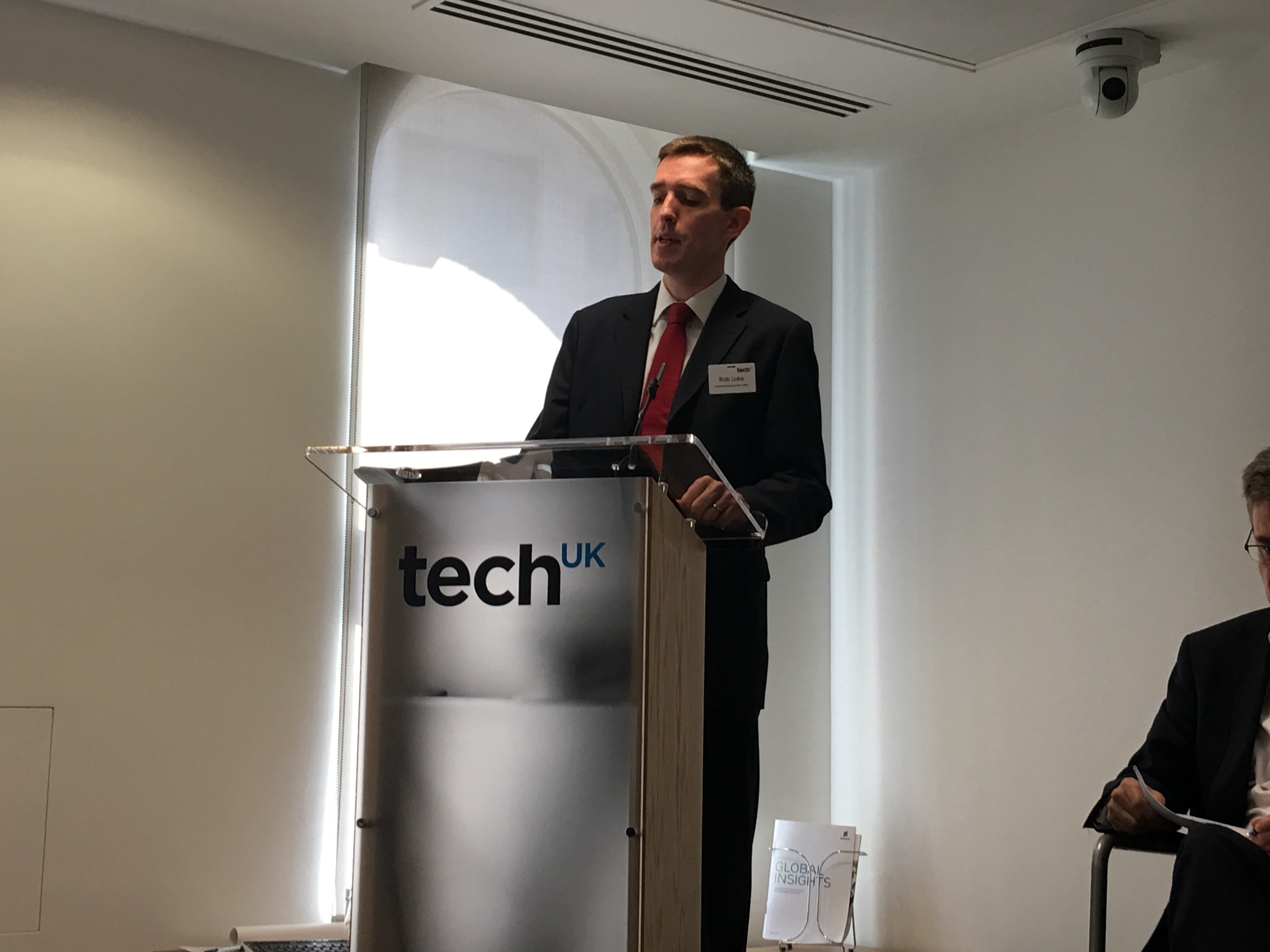ICO calls for GDPR transparency and accountability
Put individuals at the heart of data protection, urges data watchdog


An impending overhaul of data protection law will present "opportunities and challenges" for companies as they prepare for the changes, which are one year away today.
The General Data Protection Regulation (GDPR) will hand EU citizens more control over how organisations use their personal data, and impose stringent rules on how organisations handle that data and what they can use it for.
In a discussion at TechUK's London headquarters today, Rob Luke, deputy information commissioner of the Information Commissioner's Office (ICO), said that organisations typically ask the UK data watchdog for granular guidance "often people will say to us: tell us what we need to do'".
He added that the ICO was "working at pace to produce detailed guidance, both at national level but also European level guidance produced by the Article 29 EU Working Party, to which we are making a major contribution".
Organisations should be proactive in gaining compliance, rather than adopt a reactive approach to their GDPR preparations, motivated solely by a mindset of compliance or risk management, the ICO contends.
"Those organisations which thrive under GDPR will be those who recognise that the key feature of GDPR is to put the individual at the heart of data protection law," says Luke.
"Thinking first about how people want their data handled and then using those principles to underpin how you go about preparing for GDPR means you won't go far wrong," he adds.
Get the ITPro daily newsletter
Sign up today and you will receive a free copy of our Future Focus 2025 report - the leading guidance on AI, cybersecurity and other IT challenges as per 700+ senior executives
Luke believes that preparations for the forthcoming regulations boiled down to two words: "transparency" and "accountability".
"Being clear with individuals how their personal data is being used, and placing the highest standards of data protection at the heart of how you do business," Luke explains
GDPR, he believes, is a board-level issyue no matter the size of the company, not least because under GDPR the regulator "wields a bigger stick". For the most serious violations of the law, the ICO will have the power to fine companies up to 20million or 4%of a company's total annual worldwide turnover, whichever is larger.
But the cost to business of poor practice in this area goes above and beyond any fine the ICO could impose, Luke argues.
"Losing your consumers' trust could be terminal for your reputation and for your organisation," he says."A model where organisations take an approach to data protection which earns the trust of consumers in a more systematic way [is better]. And where that trust translates into competitive advantage for those who lead the charge."
Andrew Rogoyski, vice president of cyber security services at CGI UK, urges boards and CEOs to plan how their firms will achieve compliance, but doesn'tthink organisations could already be compliant with one year to go.
He warned that the regulations could "amplify potential share price movements as a result of a data breach" and therefore boards' and CEOs' attention is "crucial".
While GDPR is helpful now, he thought it would be different in a few years' time. "If you think about 2025 and automation there will be key differences in handling information and privacy."
David Erdos, a lecturer in law and the open society at Cambridge University, sees GDPR as a step up in terms of a rules-based approach. "The aim is harmonisation across Europe" but derogations from this will have an important impact," he says.
Erdos adds that he doesn't think the UK will move away from EU's fundamental values on data protection following Brexit.
Emma Butler, data protection officer at digital identity firm Yoti, says that adhering to GDPR regulations starts in the legal department but "actually it is [about] change management".
"GDPR is an opportunity to make sure you are doing information governance really well," she claims, adding that there are threats and risks coming from GDPR but these shouldn't be an organisation's sole focus.
Antony Walker, deputy CEO of TechUK, believes there are questions about whether the UK will continue to stay in step with evolving data policy discussions in Europe, adding that the ICO is "clearly very influential" but Brexit now "limits the amount of time available to consider how to implement GDPR in a UK context".
ICO outlines its GDPR guidance priorities General Data Protection Regulation (GDPR) GDPR preparation: 2018 data protection changes
Picture credit: Rene Millman/IT Pro
Rene Millman is a freelance writer and broadcaster who covers cybersecurity, AI, IoT, and the cloud. He also works as a contributing analyst at GigaOm and has previously worked as an analyst for Gartner covering the infrastructure market. He has made numerous television appearances to give his views and expertise on technology trends and companies that affect and shape our lives. You can follow Rene Millman on Twitter.
-
 OpenAI's new GPT-4.1 models miss the mark on coding tasks
OpenAI's new GPT-4.1 models miss the mark on coding tasksNews OpenAI says its GPT-4.1 model family offers sizable improvements for coding, but tests show competitors still outperform it in key areas.
By Ross Kelly
-
 Meta just revived plans to train AI models using European user data
Meta just revived plans to train AI models using European user dataNews Meta has confirmed plans to train AI models using European users’ public content and conversations with its Meta AI chatbot.
By Nicole Kobie
-
 AI recruitment tools are still a privacy nightmare – here's how the ICO plans to crack down on misuse
AI recruitment tools are still a privacy nightmare – here's how the ICO plans to crack down on misuseNews The ICO has issued guidance for recruiters and AI developers after finding that many are mishandling data
By Emma Woollacott
-
 “You must do better”: Information Commissioner John Edwards calls on firms to beef up support for data breach victims
“You must do better”: Information Commissioner John Edwards calls on firms to beef up support for data breach victimsNews Companies need to treat victims with swift, practical action, according to the ICO
By Emma Woollacott
-
 LinkedIn backtracks on AI training rules after user backlash
LinkedIn backtracks on AI training rules after user backlashNews UK-based LinkedIn users will now get the same protections as those elsewhere in Europe
By Emma Woollacott
-
 UK's data protection watchdog deepens cooperation with National Crime Agency
UK's data protection watchdog deepens cooperation with National Crime AgencyNews The two bodies want to improve the support given to organizations experiencing cyber attacks and ransomware recovery
By Emma Woollacott
-
 ICO slams Electoral Commission over security failures
ICO slams Electoral Commission over security failuresNews The Electoral Commission has been reprimanded for poor security practices, including a failure to install security updates and weak password policies
By Emma Woollacott
-
 Disgruntled ex-employees are using ‘weaponized’ data subject access requests to pester firms
Disgruntled ex-employees are using ‘weaponized’ data subject access requests to pester firmsNews Some disgruntled staff are using DSARs as a means to pressure former employers into a financial settlement
By Emma Woollacott
-
 ICO reprimands Coventry school over repeated data protection failures
ICO reprimands Coventry school over repeated data protection failuresNews The ICO said the academy trust failed to follow previous guidance, which caused a serious data breach
By Emma Woollacott
-
 ICO dishes out fine to HelloFresh for marketing spam campaign
ICO dishes out fine to HelloFresh for marketing spam campaignNews HelloFresh failed to offer proper opt-outs, the ICO said, and customers weren’t warned their data would be used for months after they cancelled
By Emma Woollacott